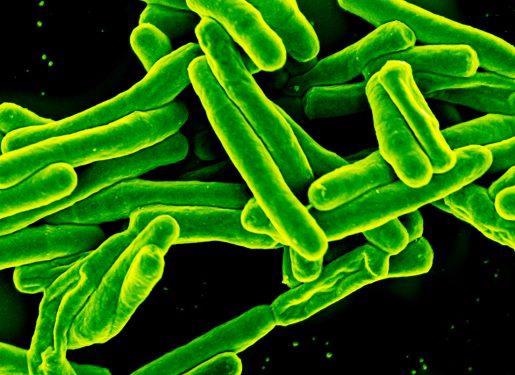Reviewed by Danielle Ellis, B.Sc.Mar 25 2022
Tuberculosis (TB) is a possibly deadly infectious disease caused by the Mycobacterium tuberculosis bacterium. The bacteria are most commonly seen in the lungs, but they can also infect other organs.
 Colorized scanning electron micrograph of Mycobacterium tuberculosis bacteria, which cause TB. Image Credit: Courtesy of National Institute of Allergy and Infectious Diseases.
Colorized scanning electron micrograph of Mycobacterium tuberculosis bacteria, which cause TB. Image Credit: Courtesy of National Institute of Allergy and Infectious Diseases.
According to the Centers for Disease Control and Prevention (CDC), M. tuberculosis infected 1.7 billion individuals in 2018, or nearly 23% of the world’s population. CDC recorded 7,174 tuberculosis cases in the United States in 2020, with 13 million people living with a dormant tuberculosis infection (where the bacteria are present but do not produce disease).
Survivors of TB have a higher risk of recurring infection and mortality even after effective tuberculosis treatment.
In the current study, scientists at Baylor College of Medicine identified that the cells of humans and animals that recovered from tuberculosis had prematurely aged up to 12 to 14 years.
It’s possible that this premature cellular aging is one reason why survivors of tuberculosis have a higher risk of mortality, sometimes a three-fold higher.”
Dr Andrew DiNardo, Study Senior Author and Assistant Professor, Medicine–Infectious Diseases, Baylor College of Medicine
TB changes the epigenetic clock
The researchers examined the epigenetic clock of the TB-affected cells to determine how old they were. Epigenetics studies the coiling of DNA inside each cell. The way human DNA is coiled changes as individuals age and acute infection modifies it in such a manner that it accelerates aging.
Scientists looked at multiple cohorts and tissue types in this study and discovered that TB caused changes in epigenetic regulation, especially DNA methylation-mediated control. These epigenetic changes were correlated with oxidative stress-induced senescence and were linked with premature cellular aging. They were conserved across both animal models and humans.
This is an essential area to look at after any serious infection, including sepsis or even SARS-CoV-2, according to DiNardo, who also works at Texas Children’s Hospital. The intensity of the infection may also have a role in the cells’ aging.
A multi-omic epigenetic clock assay could become part of the standard of care for infectious diseases and further inform about increased risk for other diseases after chronic conditions or environmental exposure.”
Dr Cristian Coarfa, Study Co-Corresponding Author and Associate Professor, Molecular and Cellular Biology, Baylor College of Medicine
Dr Cristian Coarfa is also with Dan L Duncan Comprehensive Cancer Center.
Epigenomics and other “omics” data, such as proteomics (proteins created), metabolomics (metabolites present), and microbiomics (microorganisms), would be combined in a multi-omic strategy.
Now that we know the mechanism, there are some ways that we can target it to slow down and decrease the premature epigenetic aging that is happening in these cells.”
Dr Cristian Coarfa, Study Co-Corresponding Author and Associate Professor, Molecular and Cellular Biology, Baylor College of Medicine
Source:
Journal reference:
Bobak, C. A., et al. (2022) Increased DNA methylation, cellular senescence and premature epigenetic aging in guinea pigs and humans with tuberculosis. Aging. doi.org/10.18632/aging.203936.